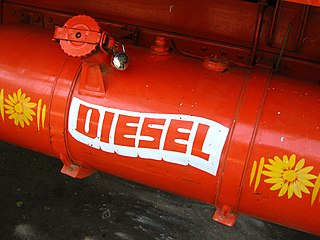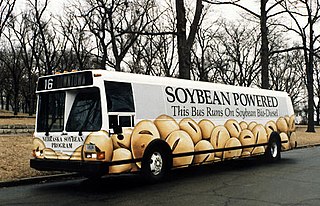
Diesel fuel, also called diesel oil or historically heavy oil, is any liquid fuel specifically designed for use in a diesel engine, a type of internal combustion engine in which fuel ignition takes place without a spark as a result of compression of the inlet air and then injection of fuel. Therefore, diesel fuel needs good compression ignition characteristics.

Biofuel is a fuel that is produced over a short time span from biomass, rather than by the very slow natural processes involved in the formation of fossil fuels, such as oil. Biofuel can be produced from plants or from agricultural, domestic or industrial biowaste.

Biodiesel is a form of diesel fuel derived from plants or animals and consisting of long-chain fatty acid esters. It is typically made by chemically reacting lipids such as animal fat (tallow), soybean oil, or some other vegetable oil with an alcohol, producing a methyl, ethyl or propyl ester by the process of transesterification.
Cetane number is an indicator of the combustion speed of diesel fuel and compression needed for ignition. It plays a similar role for diesel as octane rating does for gasoline. The CN is an important factor in determining the quality of diesel fuel, but not the only one; other measurements of diesel fuel's quality include energy content, density, lubricity, cold-flow properties and sulphur content.
Ultra-low-sulfur diesel (ULSD) is diesel fuel with substantially lowered sulfur content. Since 2006, almost all of the petroleum-based diesel fuel available in Europe and North America has been of a ULSD type.
In chemistry, acid value is a number used to quantify the acidity of a given chemical substance. It is the quantity of base, expressed as milligrams of KOH required to neutralize the acidic constituents in 1 gram of a sample.
EN 14214 is a standard published by the European Committee for Standardization that describes the requirements and test methods for FAME - the most common type of biodiesel.

This article describes the use and availability of biodiesel in various countries around the world.
Neste MY Renewable Diesel is a vegetable oil refining fuel production process commercialized by the Finnish oil and refining company Neste. Whether as an admixture or in its pure form, Neste MY Renewable Diesel is able to supplement or partially replace diesel fuel without problems. Neste MY Renewable Diesel guarantees that every gallon sold meets ASTM D975 and EN 15490 specifications in compliance with OEM standards.
The United States produces mainly biodiesel and ethanol fuel, which uses corn as the main feedstock. The US is the world's largest producer of ethanol, having produced nearly 16 billion gallons in 2017 alone. The United States, together with Brazil accounted for 85 percent of all ethanol production, with total world production of 27.05 billion gallons. Biodiesel is commercially available in most oilseed-producing states. As of 2005, it was somewhat more expensive than fossil diesel, though it is still commonly produced in relatively small quantities.
Biofuel is fuel that is produced from organic matter (biomass), including plant materials and animal waste. It is considered a renewable source of energy that can assist in reducing carbon emissions. The two main types of biofuel currently being produced in Australia are biodiesel and bioethanol, used as replacements for diesel and petrol (gasoline) respectively. As of 2017 Australia is a relatively small producer of biofuels, accounting for 0.2% of world bioethanol production and 0.1% of world biodiesel production.

Vegetable oils are increasingly used as a substitute for fossil fuels. Vegetable oils are the basis of biodiesel, which can be used like conventional diesel. Some vegetable oil blends are used in unmodified vehicles, but straight vegetable oil often needs specially prepared vehicles which have a method of heating the oil to reduce its viscosity and surface tension, sometimes specially made injector nozzles, increased injection pressure and stronger glow-plugs, in addition to fuel pre-heating is used. Another alternative is vegetable oil refining.

Biodiesel is commercially available in most oilseed-producing states in the United States. As of 2005, it is more expensive than petroleum-diesel, though it is still commonly produced in relatively small quantities.

Biodiesel has a number of standards for its quality.

The use of biofuels varies by region. The world leaders in biofuel development and use are Brazil, United States, France, Sweden and Germany.
United Metro Energy Corp. is a family-owned energy company that supplies and delivers bioheat, biodiesel, heating oil, ultra-low sulfur diesel fuel, natural gas and gasoline from its terminals in Greenpoint, Brooklyn, New York and Calverton, Long Island, New York. United Metro Energy is currently building one of the largest biodiesel plants in North America, with a capacity up to 110 million gallons per year, directly adjacent to United Metro Energy's existing Brooklyn terminal. The biodiesel processing facility will be able to accept multiple feedstocks, including waste restaurant grease, animal fats, and soy and canola oil. United Metro Energy plans to process 100% renewable biodiesel which can be blended with heating oil or diesel fuel. The plant will employ technology that will enable United Metro Energy to capture and utilize waste generated by the process. The plant is scheduled to open in Third Quarter 2012.
United States policy in regard to biofuels, such as ethanol fuel and biodiesel, began in the early 1990s as the government began looking more intensely at biofuels as a way to reduce dependence on foreign oil and increase the nation's overall sustainability. Since then, biofuel policies have been refined, focused on getting the most efficient fuels commercially available, creating fuels that can compete with petroleum-based fuels, and ensuring that the agricultural industry can support and sustain the use of biofuels.

Global Clean Energy Holdings (OTC:GCEH) is a Southern California-based renewable energy company with interests in the production and commercialization of non-food-based feedstocks used for the production of biofuels, biomass, and renewable chemicals. It was founded in 2007.

Sustainable Oils is a renewable fuels company specializing in the research and production of Camelina, the only advanced biofuels feedstock with United States Department of Agriculture, Environmental Protection Agency, and Food and Drug Administration (FDA) regulatory approvals. Oil extracted from Camelina seeds can be processed into a number of renewable products including renewable jet fuel, green diesel, biodiesel, green plastics and renewable oleochemicals. The biomass that remains after oil extraction, generally referred to seedcake or meal, can be used as nutrient-rich animal feed. Camelina offers several advantages over traditional biofuel feedstocks like soy and corn, such as competitive oil yields and shorter growing seasons. Sustainable Oils has its primary operations in the state of Montana and is headquartered in Great Falls.

Kenlon Johannes is an American businessman and the former Administrator and CEO of the Kansas Soybean Commission and Association. His continued advocacy for biodiesel spans three decades, and he is credited with being the driving force behind the growth of soybean oil within the biodiesel industry, granting him the nickname “the ‘godfather’ of biodiesel.” Johannes has also served as the executive director for multiple soybean organizations.









